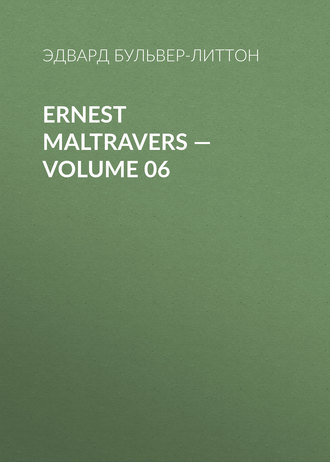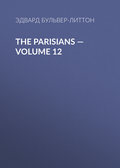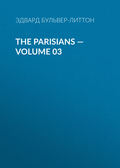
Эдвард Бульвер-Литтон
Ernest Maltravers — Volume 06
With these thoughts Ferrers sought Mrs. Templeton. He opened the folding-doors very gently, for all his habitual movements were quick and noiseless, and perceived that Mrs. Templeton sat by the window, and that she seemed engrossed with a book which lay open on a little work-table before her.
"Fordyce's /Advice to Young Married Women/, I suppose. Sly jade!
However, I must not have her against me."
He approached; still Mrs. Templeton did not note him; nor was it till he stood facing her that he himself observed that her tears were falling fast over the page.
He was a little embarrassed, and, turning towards the window, affected to cough, and then said, without looking at Mrs. Templeton, "I fear I have disturbed you."
"No," answered the same low, stifled voice that had before replied to Lumley's vain attempts to provoke conversation; "it was a melancholy employment, and perhaps it is not right to indulge in it."
"May I inquire what author so affected you."
"It is but a volume of poems, and I am no judge of poetry; but it contains thoughts which—which—" Mrs. Templeton paused abruptly, and Lumley quietly took up the book.
"Ah!" said he, turning to the title-page—"my friend ought to be much flattered."
"Your friend?"
"Yes: this, I see, is by Ernest Maltravers, a very intimate ally of mine."
"I should like to see him," cried Mrs. Templeton, almost with animation. "I read but little; it was by chance that I met with one of his books, and they are as if I heard a dear friend speaking to me. Ah! I should like to see him!"
"I'm sure, madam," said the voice of a third person, in an austere and rebuking accent, "I do not see what good it would do your immortal soul to see a man who writes idle verses, which appear to me, indeed, highly immoral. I just looked into that volume this morning and found nothing but trash—love-sonnets, and such stuff."
Mrs. Templeton made no reply, and Lumley, in order to change the conversation, which seemed a little too matrimonial for his taste, said, rather awkwardly, "You are returned very soon, sir."
"Yes, I don't like walking in the rain!"
"Bless me, it rains, so, it does—I had not observed—"
"Are you wet, sir? had you not better—" began the wife timidly.
"No, ma'am, I'm not wet, I thank you. By the by, nephew, this new author is a friend of yours. I wonder a man of his family should condescend to turn author. He can come to no good. I hope you will drop his acquaintance—authors are very unprofitable associates, I'm sure. I trust I shall see no more of Mr. Maltravers's books in my house."
"Nevertheless, he is well thought of, sir, and makes no mean figure in the world," said Lumley, stoutly; for he was by no means disposed to give up a friend who might be as useful to him as Mr. Templeton himself.
"Figure or no figure—I have not had many dealings with authors in my day; and when I had I always repented it. Not sound, sir, not sound—all cracked somewhere. Mrs. Templeton, have the kindness to get the Prayer-book—my hassock must be fresh stuffed, it gives me quite a pain in my knee. Lumley, will you ring the bell? Your aunt is very melancholy. True religion is not gloomy; we will read a sermon on Cheerfulness."
"So, so," said Mr. Ferrers to himself, as he undressed that night—"I see that my uncle is a little displeased with my aunt's pensive face—a little jealous of her thinking of anything but himself: /tant mieux/. I must work upon this discovery; it will not do for them to live too happily with each other. And what with that lever, and what with his ambitious projects, I think I see a way to push the good things of this world a few inches nearer to Lumley Ferrers."
CHAPTER III
"The pride too of her step, as light
Along the unconscious earth she went,
Seemed that of one born with a right
To walk some heavenlier element."
/Loves of the Angels./
"Can it be
That these fine impulses, these lofty thoughts
Burning with their own beauty, are but given
To make me the low slave of vanity?
—/Erinna./
"Is she not too fair
Even to think of maiden's sweetest care?
The mouth and brow are contrasts."
—/Ibid./
IT was two or three evenings after the date of the last chapter, and there was what the newspapers call "a select party" in one of the noblest mansions in London. A young lady, on whom all eyes were bent, and whose beauty might have served the painter for a model of Semiramis or Zenobia, more majestic than became her years, and so classically faultless as to have something cold and statue-like in its haughty lineaments, was moving through the crowd that murmured applauses as she passed. This lady was Florence Lascelles, the daughter of Lumley's great relation, the Earl of Saxingham, and supposed to be the richest heiress in England. Lord Saxingham himself drew aside his daughter as she swept along.
"Florence," said he in a whisper, "the Duke of ——— is greatly struck with you—be civil to him—I am about to present him."
So saying, the earl turned to a small, dark, stiff-looking man, of about twenty-eight years of age, at his left, and introduced the Duke of ——— to Lady Florence Lascelles. The duke was unmarried; it was an introduction between the greatest match and the wealthiest heiress in the peerage.
"Lady Florence," said Lord Saxingham, "is as fond of horses as yourself, duke, though not quite so good a judge."
"I confess I /do/ like horses," said the duke, with an ingenuous air.
Lord Saxingham moved away.
Lady Florence stood mute—one glance of bright contempt shot from her large eyes; her lip slightly curled, and she then half turned aside, and seemed to forget that her new acquaintance was in existence.
His grace, like most great personages, was not apt to take offence; nor could he, indeed, ever suppose that any slight towards the Duke of ——— could be intended; still he thought it would be proper in Lady Florence to begin the conversation; for he himself, though not shy, was habitually silent, and accustomed to be saved the fatigue of defraying the small charges of society. After a pause, seeing, however, that Lady Florence remained speechless, he began:
"You ride sometimes in the Park, Lady Florence?"
"Very seldom."
"It is, indeed, too warm for riding at present."
"I did not say so."
"Hem—I thought you did."
Another pause.
"Did you speak, Lady Florence?"
"No."
"Oh, I beg pardon—Lord Saxingham is looking very well."
"I am glad you think so."
"Your picture in the exhibition scarcely does you justice, Lady Florence; yet Lawrence is usually happy."
"You are very flattering," said Lady Florence, with a lively and perceptible impatience in her tone and manner. The young beauty was thoroughly spoilt—and now all the scorn of a scornful nature was drawn forth, by observing the envious eyes of the crowd were bent upon one whom the Duke of ——— was actually talking to. Brilliant as were her own powers of conversation, she would not deign to exert them—she was an aristocrat of intellect rather than birth, and she took it into her head that the duke was an idiot. She was very much mistaken. If she had but broken up the ice, she would have found that the water below was not shallow. The duke, in fact, like many other Englishmen, though he did not like the trouble of showing forth, and had an ungainly manner, was a man who had read a good deal, possessed a sound head and an honourable mind, though he did not know what it was to love anybody, to care much for anything, and was at once perfectly sated and yet perfectly contented; for apathy is the combination of satiety and content.
Still Florence judged of him as lively persons are apt to judge of the sedate; besides, she wanted to proclaim to him and to everybody else, how little she cared for dukes and great matches; she, therefore, with a slight inclination of her head, turned away, and extended her hand to a dark young man, who was gazing on her with that respectful but unmistakable admiration which proud women are never proud enough to despise.
"Ah, signor," said she, in Italian, "I am so glad to see you; it is a relief, indeed, to find genius in a crowd of nothings."
So saying, the heiress seated herself on one of those convenient couches which hold but two, and beckoned the Italian to her side. Oh, how the vain heart of Castruccio Cesarini beat!—what visions of love, rank, wealth, already flitted before him!
"I almost fancy," said Castruccio, "that the old days of romance are returned, when a queen could turn from princes and warriors to listen to a troubadour."
"Troubadours are now more rare than warriors and princes," replied Florence, with gay animation, which contrasted strongly with the coldness she had manifested to the Duke of ———, "and therefore it would not now be a very great merit in a queen to fly from dulness and insipidity to poetry and wit."
"Ah, say not wit," said Cesarini; "wit is incompatible with the grave character of deep feelings;—incompatible with enthusiasm, with worship;—incompatible with the thoughts that wait upon Lady Florence Lascelles."
Florence coloured and slightly frowned; but the immense distinction between her position and that of the young foreigner, with her own inexperience, both of real life and the presumption of vain hearts, made her presently forget the flattery that would have offended her in another. She turned the conversation, however, into general channels, and she talked of Italian poetry with a warmth and eloquence worthy of the theme. While they thus conversed, a new guest had arrived, who, from the spot where he stood, engaged with Lord Saxingham, fixed a steady and scrutinising gaze upon the pair.
"Lady Florence has indeed improved," said this new guest. "I could not have conceived that England boasted any one half so beautiful."
"She certainly is handsome, my dear Lumley,—the Lascelles cast of countenance," replied Lord Saxingham," and so gifted! She is positively learned—quite a /bas bleu/. I tremble to think of the crowd of poets and painters who will make a fortune out of her enthusiasm. /Entre nous/, Lumley, I could wish her married to a man of sober sense, like the Duke of ———; for sober sense is exactly what she wants. Do observe, she has been sitting just half an hour flirting with that odd-looking adventurer, a Signor Cesarini, merely because he writes sonnets and wears a dress like a stage-player!"
"It is the weakness of the sex, my dear lord," said Lumley; "they like to patronise, and they dote upon all oddities, from China monsters to cracked poets. But I fancy, by a restless glance cast every now and then around the room, that my beautiful cousin has in her something of the coquette."
"There you are quite right, Lumley," returned Lord Saxingham, laughing; "but I will not quarrel with her for breaking hearts and refusing hands, if she do but grow steady at last, and settle into the Duchess of ———."
"Duchess of ———!" repeated Lumley, absently; "well, I will go and present myself. I see she is growing tired of the signor. I will sound her as to the ducal impressions, my dear lord."
"Do—I dare not," replied the father; "she is an excellent girl, but heiresses are always contradictory. It was very foolish to deprive me of all control over her fortune. Come and see me again soon, Lumley. I suppose you are going abroad?"
"No, I shall settle in England; but of my prospects and plans more hereafter."
With this, Lumley quietly glided away to Florence. There was something in Ferrers that was remarkable from its very simplicity. His clear, sharp features, with the short hair and high brow—the absolute plainness of his dress, and the noiseless, easy, self-collected calm of all his motions, made a strong contrast to the showy Italian, by whose side he now stood. Florence looked up at him with some little surprise at his intrusion.
"Ah, you don't recollect me!" said Lumley, with his pleasant laugh.
"Faithless Imogen, after all your vows of constancy! Behold your Alonzo!
'The worms they crept in and the worms they crept out.'
"Don't you remember how you trembled when I told you that true story, as we
'Conversed as we sat on the green"?
"Oh!" cried Florence, "it is indeed you, my dear cousin—my dear Lumley!
What an age since we parted!"
"Don't talk of age—it is an ugly word to a man of my years. Pardon, signor, if I disturb you."







